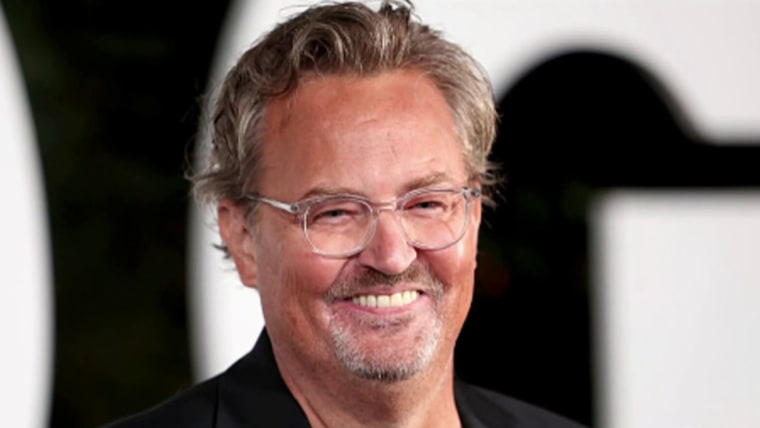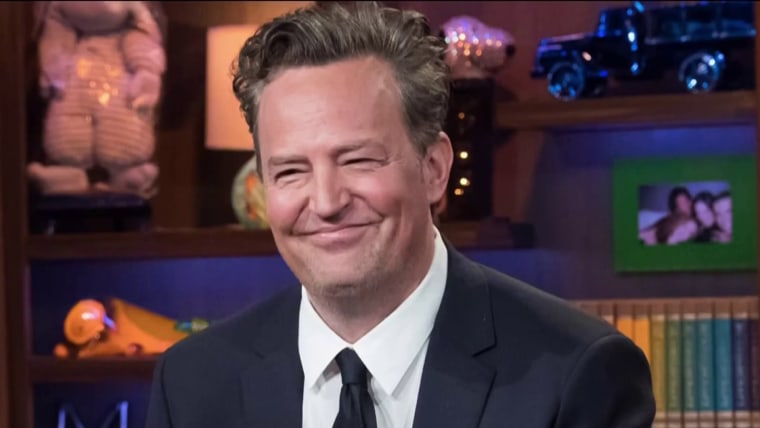A web of people motivated by greed — two doctors, a live-in-personal assistant, an acquaintance and a drug dealer known as the “ketamine queen” — conspired to provide Matthew Perry with the ketamine that caused his accidental overdose death last year, federal authorities announced Thursday.
The five individuals have all been charged in connection with Perry’s death. As his descent into ketamine addiction deepened last fall, they took advantage of the actor’s vulnerable condition to enrich themselves, authorities said.
“They knew what they were doing was wrong. They knew what they were doing was risking great danger to Mr. Perry,” U.S. Attorney Martin Estrada said at a news conference. “But they did it anyways. In the end, these defendants were more interested in profiting off of Mr. Perry than caring for his well being.”
Perry, 54, was found face down in the heated end of a pool at his Pacific Palisades home on Oct. 28, 2023. The Los Angeles County Medical Examiner’s Office attributed his death to the acute effects of ketamine, an anesthetic with psychedelic properties.
According to an 18-count superseding indictment, the events leading to Perry’s death began in September when a Santa Monica doctor, Salvador Plasencia, learned that Perry wanted ketamine. Long known as a club drug, it’s increasingly used to treat people with depression and other mental health issues but carries serious medical risks.
Plasencia reached out to another doctor, Mark Chavez, of San Diego, who had owned a ketamine clinic. Soon the two physicians were discussing how much to charge Perry for the drug.
“I wonder how much this moron will pay,” Plasencia said in a text message to Chavez, according to the indictment. “Lets find out.”
Plasencia went on to provide ketamine to Perry and his assistant, Kenneth Iwamasa, 59. Plasencia repeatedly injected Perry with the drug himself and also instructed Iwamasa on how to do it, the indictment says.
“It was like a bad movie,” Plasencia wrote in a text message to Chavez, the indictment says.
From September until Perry’s death in late October, the doctors provided him with about 20 vials of ketamine at a price of $55,000 in cash, federal prosecutors said.
In mid-October, Iwamasa sought an additional source of ketamine for his troubled boss, the indictment said. He reached out to an acquaintance of Perry’s, Erik Fleming, who then reached out to a major underground seller known as the "ketamine queen."
A dual U.S. and U.K. citizen who lived in North Hollywood, Jasveen Sangha had been selling ketamine and other drugs for years, according to federal prosecutors.
She knew that ketamine could be fatal. In August 2019, a man overdosed on ketamine provided by Sangha, prosecutors said. Afterward, one of the man’s family members sent a text to Sangha. "The ketamine you sold my brother killed him," they wrote. "It's listed as the cause of death."
According to prosecutors, Sangha then typed a question into Google: “Can ketamine be listed as a cause of death.”
She began providing the drugs to Perry through Fleming, and he coordinated the sales with Iwamasa, the indictment says. On Oct. 28, Iwamasa injected Perry with at least three shots of ketamine using syringes provided by Plasencia, according to the indictment.
The actor, best known for playing Chandler Bing on the hit sitcom “Friends,” was found unresponsive in his pool later that day.
“Matthew Perry’s journey began with unscrupulous doctors who abused their position of trust because they saw him as a payday,” Drug Enforcement Administration chief Anne Millgram said at the Thursday news conference. “And it ended with street dealers who sold him ketamine in unmarked vials.”
Sangha, 41, and Plasencia, 42, were both arrested Thursday in Southern California. They were charged with one count of conspiracy to distribute ketamine. Sangha was also charged with several other drug-related offenses.
Plasencia, who appeared shackled and in dress clothes during a court hearing Thursday, pleaded not guilty. His bond was set at $100,000.
The judge overseeing the case agreed to allow the non-controlled substance part of Placensia’s practice to remain open if he posts a note at his office explaining the charges and seeks releases from patients stating that they understand the allegations against him.
Plasencia's next hearing is scheduled for Aug. 28.
A lawyer for Plasencia, who operated a clinic in a strip mall in Calabasas, did not immediately respond to a request for comment. The owner of a local business, who asked not to be named for fear of harassment, said he met Plasencia briefly about two months ago after noticing a sign for weight loss medication at the clinic.
Plasencia offered him weight loss drugs without a consultation, the business owner said. The local business owner declined. “I’m glad I didn’t do it,” he said.
On Thursday afternoon, a sign advertising weight loss medication remained outside Palencia’s clinic but the front doors were locked. A handwritten note said the urgent care would be closed for the day.
After Perry’s death, federal agents and detectives searched Sangha's home. They found approximately 79 vials of ketamine, three pounds of orange pills containing methamphetamine, hallucinogenic mushrooms and cocaine.
Sangha appeared in court wearing large round glasses and a bright green baggy Nirvana T-shirt. After she pleaded not guilty, a judge ordered her to be held without bail, saying she was a flight risk.
Sangha was previously arrested in March in a separate federal drug case in which she was accused of being "a large volume drug dealer." She was released from custody in that case after she posted a $100,000 bond, according to court records.
Iwamasa, Perry's 59-year-old assistant, pleaded guilty on Aug. 7 to one count of conspiracy to distribute ketamine causing a death. He admitted to repeatedly injecting Perry with ketamine without medical training, including on the day the actor died, according to prosecutors.
Chavez, 54, the physician based in San Diego, has agreed to plead guilty to one count of conspiracy to distribute ketamine, prosecutors said. He admitted to selling ketamine to Plasencia, according to prosecutors.
Fleming, 54, the acquaintance who helped Perry procure ketamine, pleaded guilty on Aug. 8 to one count of conspiracy to distribute ketamine and one count of distribution of ketamine resulting in death. He admitted to distributing the ketamine that killed Perry — drugs that he received from Sangha, according to prosecutors.
Perry had been undergoing ketamine infusion therapy to treat depression and anxiety, but his last session took place more than a week prior to his death. The medical examiner noted that the ketamine in Perry’s system “could not be from that infusion therapy” given its short half-life.
The levels of ketamine in his body were high — equivalent to the amount used for general anesthesia during surgery, according to the medical examiner. The coroner ultimately ruled his death an accident.
Perry had been open about his lengthy struggles with opioid addiction and alcoholism, which he chronicled in his 2022 memoir, “Friends, Lovers and the Big Terrible Thing.”
It’s not uncommon for law enforcement to investigate — and in some cases bring charges against — the people who supplied the drugs that caused a high-profile death.
After the death of Michael Jackson in 2009, his private physician, Dr. Conrad Murray, was found guilty of involuntary manslaughter for providing the singer with a fatal dose of powerful drugs. More recently, federal prosecutors in New York brought charges against four men who supplied actor Michael K. Williams with the fentanyl-laced heroin that killed him in 2021.
The family of “Dateline” correspondent Keith Morrison, who is Perry’s stepfather, said in a statement that they welcomed the news of the law enforcement action.
“We were and still are heartbroken by Matthew’s death, but it has helped to know law enforcement has taken his case very seriously,” the family said. “We look forward to justice taking its course.”


